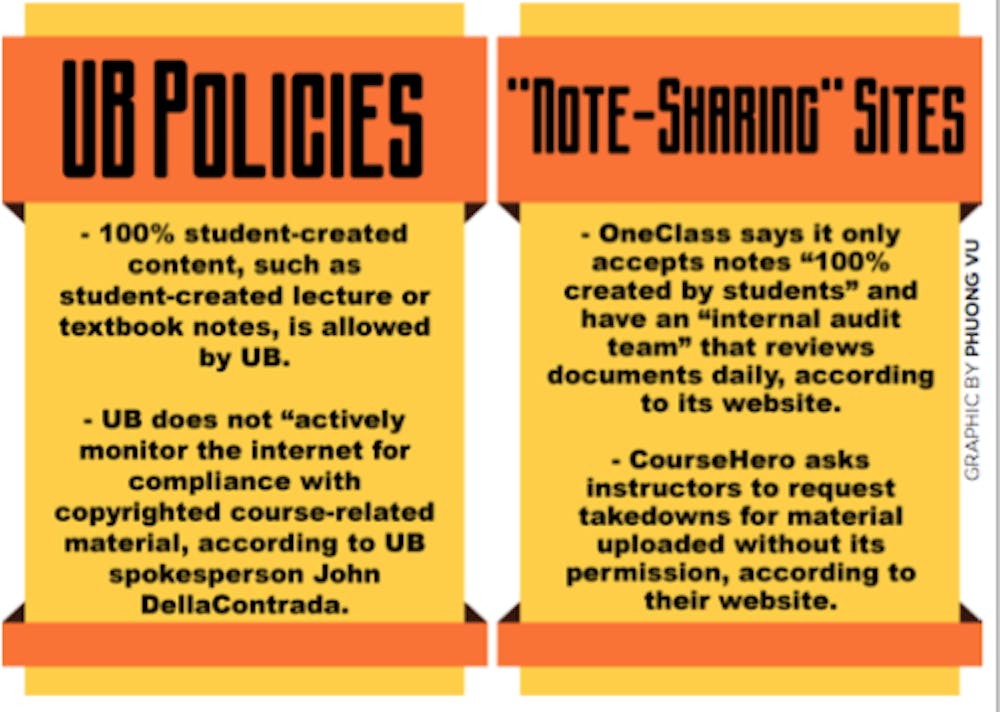Lara Hutson, director of undergraduate studies and a professor of biological sciences, regularly finds her lecture slides and the answers to her lab questions posted online.
It’s her former students doing the posting, usually on CourseHero, a “note-sharing” site that pays students hundreds of dollars a semester to upload and share course material. The Spectrum found students who made close to $1,000 a year by sharing course notes.
The idea is to help students study, but the reality is grimmer: students are using the notes instead of going to class and professors are seeing their work — lectures, notes, slides, tests — illegally taken, copied and shared.
Hutson has had her work uploaded for at least four years.
She is not the only one.
A Spectrum review found exams and material belonging to UB professors on CourseHero and on two other note sharing sites, StudySoup and OneClass. That’s a violation of both UB policy and United States copyright law. Exams from MTH 142 “College Calculus 2” have been on CourseHero since 2015. ANA 407 “Gross Human Anatomy” exam answer keys have sat on CourseHero for two and a half years. ECO 407 “Macroeconomic Theory” quizzes wait on OneClass for students to download.
“Historically, I’ve had a lot of [material] posted and a lot of stuff from our classes, like lab reports from a template that I create –– that part of it is my copyright,” Huston said. “What they add to it they can have a copyright to, but they’re posting the entire thing I’ve created.”
Across the country, hundreds of lectures, slides, practice exams, midterms and final exams have been posted without permission. The websites charge $10 a month for full access to the copyrighted course material and any other notes students have added.
OneClass boasted 5,830 documents as of Wednesday morning. CourseHero had 74,524.
UB has not actively pursued students posting copyrighted material on note-sharing sites. Rather, it’s been up to professors to locate their stolen materials and ask students to take content down. Students always comply, Huston said. But finding the material is time consuming and often she and other professors don’t know all the websites that arise each year.
Students can make $50 cash per shared course, along with Starbucks gift cards.
UB is not against students earning money by uploading their own content, according to Kate McKenna, director of issues management and stakeholder communication. Administrators also don’t make an intensive effort to search sites like CourseHero and OneClass.
The sites recruit students across the country through social media such as Facebook groups. For instance, OneClass has a “University at Buffalo Class of 2022” Facebook group with over 1,800 members, along with others for students at Virginia Tech, University of Coloradoand University of Minnesota, among others. OneClass groups, which have names like “June Pearson” and “Kelsey Kolson” — respond they are interested in the site.
These accounts are members of a number of other OneClass groups, including the group marketed toward UB students. The Spectrum reached out to three of these accounts asking their affiliation to OneClass’ Facebook groups. The Spectrumgot no responses and then was blocked by two account holders. OneClass’ site says it only allows notes “100 percent created by students,” and claims to have a “rigorous system to evaluate each set of notes” and an “internal audit team that checks over all documents on a daily basis.”
OneClass’ website states the platform “work[s] closely with faculty members and professors in ensuring that the site’s guidelines on plagiarism and copyrighted content is in strict accordance with as many academic institutions as possible.”
Jack Neary, OneClass’ Director of Growth, declined to respond to questions about OneClass’ relationship with UB or to questions about why copyrighted material, including tests, appeared on the site. UB spokesperson John DellaContrada said UB encourages all students, faculty and staff to engage in “safe and legally compliant sharing of copyrighted materials.” For instance, UB’s Computing and Network Use Policy “explicitly” prohibits using university computing software for “private commercial purposes,” DellaContrada said.
“Some individual instructors may independently surveil internet sites for copyright compliance of their own protected content,” DellaContrada said in an email.
“The university does not actively monitor the internet for compliance with copyrighted course-related material; the university has resources dedicated to investigating specific complaints or concerns.”
UB does not “maintain regular contact” with services such as OneClass and CourseHero, according to DellaContrada.
James Magnoli,* who graduated in May 2017, made $900 uploading class notes to StudySoup. Uploading was easy. Sometimes Magnoli felt guilty because some of the notes came directly from the professor’s lecture.
“So I did start putting [citations] on the documents as the last page, saying to ‘refer to [this or that] lecture,’” Magnoli said. “But I do think it is a good thing, the perk for uploading notes was so I could study more and it can’t really be harmful to me.”
The notes may have contained copyright material, however, and been harmful to the professors. But for Magnoli, that is a university, not a student issue.
“If UB has an issue with these websites, they should be more explicit because when used properly, they can help students,” Magnoli said.
On other sites, such as CourseHero, UB materials are labeled under “SUNY Buffalo State College.” Students who sign up for accounts can preview the 74,524 pages of class materials for free and then decide if they want to pay for access.
On CourseHero, users are encouraged to upload any material as long as it follows an “instructors’ or institution’s academic honor codes.” CourseHero asks instructors to submit takedown requests if material is uploaded illegally.
Of the 74,524 materials on CourseHero, The Spectrumdiscovered lecture slides from UB computer science, mathematics, microbiology and physics courses. Additionally, quizzes and exams from classes such as DAC 104, “Appreciating Dance,” appeared on CourseHero but were deleted as of Wednesday night.
Hutson said the sites encourage students to violate UB’s academic integrity policy. She has started including warnings about buying or selling academic assignments on her syllabi. She said she feels professors like her are now doing a better job at “telling students explicitly” not to violate copyright laws.
“Certainly, I feel like I’m doing as much as I can to educate students and that has been very effective but you’re certainly not going to get everybody,” Hutson said.
Jim Atwood, a SUNY Distinguished Professor in chemistry, has a number of his materials online, including old exams and information from course textbooks.
Atwood, who coordinates Chemistry 101for the department, said the materials he gives to his students function as outlines and he doesn’t mind students posting outlines he “freely gives” to them. If the documents are copyrighted, like chemistry department lecture slides that use textbook publisher material, it becomes a concern for Atwood.
“We have very strong statements about academic integrity in all of our syllabi [in the chemistry department], but I don’t think many of them work,” Atwood said.
“I know for a fact many of the students pluck their answers from homeworks on sites where they’re posted. So I punish them the other way, I make sure I use the quizzes that have the same problems [as homeworks] and if they can’t do the problems, although they got the homework, they lose points.”
Atwood said if he used more copyrighted materials in his classes, he would search sites more often that host class documents.
Copyright material distribution isn’t just an issue for professors at UB, though.
This summer, United University Professions — a SUNY employee’s union — notified the public of its plan to take legal action against sites, such as StudySoup and CourseHero.
Jamie Dangler, UUP’s Vice President for Academics, said UUP’s efforts began last spring when officials noticed how “extensively” copyright violations are made on some websites.
As a result of members’ growing concerns with copyright violations, UUP agreed to make its first attempt at a “Cease and Desist” order to ask companies to remove all copyright materials.
“We were contacted by hundreds of members who had no idea this material was on these sites,” Dangler said. “It’s important to understand, as well, that we want to work together with students and student senates, to stress how destructive posting copyright material is. We want to step back and say ‘you can’t post these things without permission’ and play a role for students so they can think of this more prominently.”
UUP’s official publication “The Voice” recommends instructors search websites like CourseHero for material posted “without their permission” and to make the union aware of any violations.
Hutson said she asked CourseHero to block users from posting certain types of documents that violate UB’s policy, but this “hasn’t fixed the problem.”
“That would be nice, that’s a micro solution, blocking files where it is obvious what they are, but that hasn’t happened and those files still get posted,” Hutson said.
“But the problem is the proliferation of sites where you can go to download stuff like this, where students can post things and try to sell them. CourseHero is just one. There are a lot of others, and I don’t have the time to go through and micromanage that, so you have to tackle it through education.”
*Name has been changed to protect source’s concerns about copyright law violations.
Benjamin Blanchet is the senior features editor and can be reached at benjamin.blanchet@ubspectrum.com and @BenjaminUBSpec.

Benjamin Blanchet is the senior engagement editor for The Spectrum. His words have been seen in The Buffalo News (Gusto) and The Sun newspapers of Western New York. Loves cryptoquip and double-doubles.





